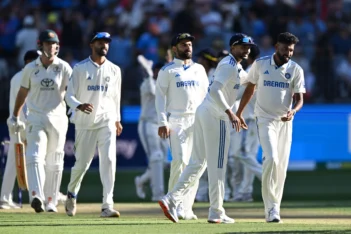The International Cricket Council (ICC) is putting an end to time-wasting tactics in white-ball cricket. The successful trial of the “stop clock” rule has convinced the governing body to make it a permanent fixture in One-Day Internationals (ODIs) and Twenty20 Internationals (T20Is). It will come into effect from June 1 in T20 World Cup 2024.
Keeping Game on Time
The stop clock rule, introduced on an experimental basis in December 2023, requires fielding teams to bowl the first ball of their next over within 60 seconds of the previous over ending. An electronic clock displayed on the ground will keep track of the time, ensuring matches finish on schedule.
How Stop Clock Works
The responsibility of enforcing this rule falls on the umpires. The third umpire will start the 60-second timer as soon as the previous over is complete. If the fielding side fails to bowl the first ball of the next over within this timeframe, they will receive warnings initially. However, any subsequent delays after the two warnings will result in a penalty of five runs being awarded to the batting team.
Flexibility for Unexpected Delays
The umpires hold the discretion to use the timer judiciously. They can choose to pause or restart the clock depending on the situation. Delays caused by legitimate reasons, such as a batsman taking time after a dismissal, a DRS review, or unforeseen circumstances, will not be penalised.
Trial Period a success: ICC
The initial trial period for the stop clock rule was due to end in April 2024. However, the ICC Cricket Committee, impressed with its effectiveness in curbing slow play, has decided to make it a permanent addition to the playing conditions. This means fans can expect to see the rule implemented during the upcoming T20 World Cup scheduled for June 2024 in the West Indies and USA.
Looking Ahead: ICC Champions Trophy and Beyond
While the stop clock rule is a welcome change for fans and players alike, the upcoming ICC meetings will address other crucial issues. The much-anticipated Champions Trophy, scheduled to take place in Pakistan later this year, could be a point of discussion, particularly considering the potential absence of India due to security concerns.







































































